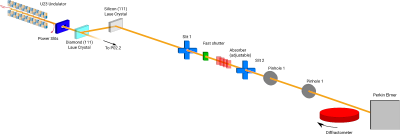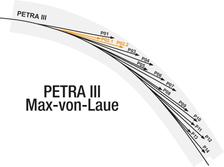The Powder Diffraction and Total Scattering Beamline, P02.1, is dedicated to study of the atomic scale structure of polycrystalline materials, both in terms of long-range periodic order – by Bragg diffraction – and local structural features, using total scattering and X-ray Pair Distribution Function (PDF) analysis. We support users from a wide range of fields including chemistry, material science, solid state physics and engineering.
P02.1 is a side station of the P02 beamline, operating simultaneously and independently of the mainline station (P02.2 – Extreme Conditions). Simultaneous operation is achieved by the beamline having a fixed high energy of 60 keV (λ ~ 0.207 A), which makes the beamline well suited for studies of
- Studies of high-Z containing polycrystalline samples
- Stress-strain measurements
- In situ or operando studies of chemical reactions, including crystallisation, catalysis and battery cells
- Investigation of nanostructured or amorphous materials
The beamline provides an unfocussed beam the size of which may be varied from ~0.2×0.2 mm2 to 1.0×1.0 mm2. Two VAREX XRD4343CT area detectors mounted on two long translation stages are available for data collection. At the longest sample to detector distances (SDD) of about 2.4 m standard powder (Bragg) diffraction suitable for structure solution and Rietveld refinement may be measured. At the minimum SDD (approx. 0.2 m) total scattering data for PDF analysis may be obtained.

A sketch layout of beamline P02.1






